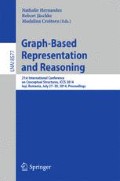Abstract
Constraint programming is a paradigm where a given problem is formalized in terms of satisfying a set of restrictions. Difficult combinatorial problems, from virtually any area, can be modeled as constraint satisfaction problems (CSP) and then solved with state-of-the-art CSP solvers. Constraints are logical relations between various entities (variables) each taking values in a given domain. There are no limitations on how constraints should be specified – they can be seen as predicates that indicate partial information known about the problem. The extensional or table constraint is used to express directly the combination of values that are allowed for some variables. Many problems from industry or academic research are modeled using extensional constraints as they are created based on sets of existing data, represented as n-ary relations (sets of tuples).
In this paper, we describe an efficient data structure for implementing relations of any arity, that combines the concepts of trie (prefix tree) and support list, offering a quick query method. Because real-life problems may lead to bulky relations, containing a large number of tuples, it is essential to provide a trade-off between space and time complexity. In our representation, a relation is not tied to a specific extensional constraint and this allows multiple constraints to share the same data structure, in order to decrease the memory requirements. Our approach is generic and can be adapted to any method of solving constraint satisfaction problems, either systematic or hybrid, making it easy to be integrated within a CSP solver.
In order to test the efficiency of our data structure, we performed empirical analyses using various constraint satisfaction problems from known benchmarks.
Access this chapter
Tax calculation will be finalised at checkout
Purchases are for personal use only
Preview
Unable to display preview. Download preview PDF.
References
Bessiere, C.: Constraint Propagation. In: Rossi, F., van Beek, P., Walsh, T. (eds.) Handbook of Constraint Programming, ch. 7. Elsevier (2006)
Bessiere, C., Regin, J.C.: Arc consistency for general constraint networks: Preliminary results. In: IJCAI (1), pp. 398–404 (1997)
Dechter, R.: Constraint processing. Elsevier Morgan Kaufmann (2003)
Frasinaru, C.: Omnics solver (2013), http://profs.info.uaic.ro/~acf/omnics
Fredkin, E.: Trie memory. Commun. ACM 3(9), 490–499 (1960), http://doi.acm.org/10.1145/367390.367400
Gent, I.P.: Minion solver (2007), http://minion.sourceforge.net/index.html
Gent, I.P., Jefferson, C., Miguel, I., Nightingale, P.: Data structures for generalised arc consistency for extensional constraints. In: AAAI, pp. 191–197. AAAI Press (2007), http://dblp.uni-trier.de/db/conf/aaai/aaai2007.html#GentJMN07
van Hoeve, W.J., Katriel, I.: Global constraints. In: Rossi, F., van Beek, P., Walsh, T. (eds.) Handbook of Constraint Programming, ch. 7. Elsevier (2006)
IBM: ILOG CPLEX Solver (2009), http://www-01.ibm.com/software/commerce/optimization/cplex-optimizer
Laburthe, F., Jussien, N.: Choco solver (2012), http://www.emn.fr/z-info/choco-solver
Mackworth, A.: Consistency in networks of relations. Artificial Intelligence 8(1), 99–118 (1977)
Rossi, F., van Beek, P., Walsh, T. (eds.): Handbook of Constraint Programming. Elsevier (2006)
Roussel, O., Lecoutre, C.: XML representation of constraint networks: Format XCSP 2.1. CoRR abs/0902.2362 (2009), http://dblp.uni-trier.de/db/journals/corr/corr0902.html#abs-0902-2362
Tsang, E.P.K.: Foundations of constraint satisfaction. Computation in cognitive science. Academic Press (1993)
Wallace, M.: Practical applications of constraint programming. Constraints 1, 139–168 (1996)
Author information
Authors and Affiliations
Corresponding author
Editor information
Editors and Affiliations
Rights and permissions
Copyright information
© 2014 Springer International Publishing Switzerland
About this paper
Cite this paper
Frăsinaru, C., Olariu, F. (2014). Efficient Representation of Extensional Constraints. In: Hernandez, N., Jäschke, R., Croitoru, M. (eds) Graph-Based Representation and Reasoning. ICCS 2014. Lecture Notes in Computer Science(), vol 8577. Springer, Cham. https://doi.org/10.1007/978-3-319-08389-6_16
Download citation
DOI: https://doi.org/10.1007/978-3-319-08389-6_16
Publisher Name: Springer, Cham
Print ISBN: 978-3-319-08388-9
Online ISBN: 978-3-319-08389-6
eBook Packages: Computer ScienceComputer Science (R0)

